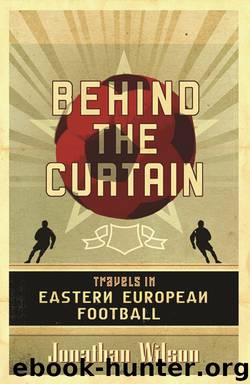Behind the Curtain: Football in Eastern Europe by Jonathan Wilson

Author:Jonathan Wilson [WILSON, JONATHAN]
Language: eng
Format: epub
ISBN: 9781409109044
Publisher: Orion Publishing Group
Published: 2012-04-08T16:00:00+00:00
iv Bosnia-Hercegovina
Walk east along ul Zelenih Beretki through the old part of Sarajevo, and you come to the Orthodox cathedral. Just up to the left is the Catholic cathedral, and next to that is the old synagogue. A few yards further on is the peaceful courtyard that surrounds the Gazi Husrevbey mosque. As my attention was drawn to their remarkable proximity, I was reminded, strangely, of the scene in JFK when Kevin Costner points out to his subordinate that each of the intelligence services in New Orleans has an office on the same square, as though gathering around the headquarters of the pro-Cuba organisation for which Lee Harvey Oswald worked. In Sarajevo, the point of triangulation is the scene of another assassination, the spot outside the City Museum at which ul Zelenih Beretki meets the river, where, on 28 June 1914, the Archduke Franz Ferdinand and his wife Sophia were shot dead by the Serb nationalist Gavrilo Princip, precipitating the First World War. A plaque bearing Princip’s footsteps used to be set in the pavement there, but it was ripped out by Muslims during the war.
In Black Lamb and Grey Falcon, the novelist Rebecca West chides the river in Sarajevo for running red, accusing it of prostrating itself too obviously before pathetic fallacy. Seven decades later, despite having yet greater and more local carnage to commemorate, the Miljacka runs largely dark green, the red showing only where the current is strong enough to part the thick weed that all but covers the river bed. Nonetheless, there is little danger of anybody forgetting the city’s tragic history. Just along from the museum, for instance, is the shell of the national library, hit by an incendiary in August 1992, a hundred years to the day after construction had begun. Everywhere, walls are dotted with bullet holes and pavements marked with ‘Sarajevo roses’, the small craters left by mortars, many of them now filled with red rubber as a memorial to the siege.
Looking straight across the river from my room in the Saray Hotel I could see a Muslim cemetery, the uniform whiteness of the gravestones itself testimony to how many died how recently. Beyond that are the hills, range upon range surrounding the town. Some are green, covered in pines; some, those closer to the city centre, the ones that were not controlled by the Serbs, are brown, stripped bare, every tree taken for firewood after the electricity supply was cut off.
It was on 2 March 1992 that Serb troops first took up positions in those hills, and laid siege to the police academy at Vraca above Grbavica, a Serb district to the south of the river. Three days later, responding to the decision by the Bosnian president, Alija Izetbegovi, leader of the main Bosniak (that is, ethnically Muslim) party, to mobilise the Bosnian civil defence, a small crowd gathered in the west of the city and marched towards the centre. As the demonstrators progressed, they were joined by thousands of others
Download
This site does not store any files on its server. We only index and link to content provided by other sites. Please contact the content providers to delete copyright contents if any and email us, we'll remove relevant links or contents immediately.
Futebol by Alex Bellos(2361)
No Hunger In Paradise by Michael Calvin(1814)
Pep Confidential by Martí Perarnau(1768)
Cristiano Ronaldo: The Biography by Guillem Balague(1557)
ALEX FERGUSON My Autobiography by Alex Ferguson(1528)
Sir Matt Busby by Patrick Barclay(1526)
The Game of Our Lives by David Goldblatt(1516)
Cyrille Regis: My Story by Cyrille Regis(1499)
Football's Strangest Matches by Andrew Ward(1482)
No Nonsense by Joey Barton(1477)
Angels with Dirty Faces by Jonathan Wilson(1424)
The Lost Boys by Ed Hawkins(1419)
Red Card by Ken Bensinger(1376)
Soccer Men: Profiles of the Rogues, Geniuses, and Neurotics Who Dominate the World's Most Popular Sport by Simon Kuper(1286)
A Season With Verona by Tim Parks(1272)
Forward: A Memoir by Abby Wambach(1251)
We Are the Damned United by Phil Rostron(1233)
Scholes : My Story (9781471125799) by Scholes Paul(1228)
50 Complete Goalkeeping Training Sessions by Hageage Tamara Browder(1219)
